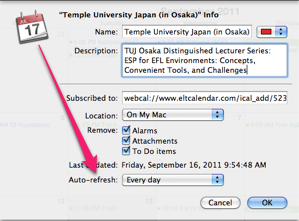Fukuoka JALT:
Temple University / Fukuoka JALT Applied Linguistics Colloquium
Date: Sunday, June 11th, 2006 Time: 10:00 AM - 5:00 PM
Speaker: Two Main Speakers and 16 short presentations
Description:
This colloquium includes two main presentations (see below) and 16 short presentations by second language teachers and second language acquisition researchers on various topics. Presentations will include three types:
1) activities for the language classroom,
2) reports on completed research, and
3) reports on work in progress.
All short presentations will be 20 minutes with a 5-minute question and answer period.
Morning Main Presentation (10:00-10:55AM):
Speaker: Dr. Marshall Childs
Bio: Dr. Childs is an American from Oregon. Dr. Childs first came to Japan as an IBM assignee in 1985. In 1990, when IBM told him to go back to the U.S., he quit IBM in order to stay in Japan, and began teaching English. Curious about the nature of language learning, he entered Temple University Japan in 1991, and graduated with an Ed.D. in 1997. He now teaches at Temple and writes a monthly column, The Practical Linguist, for The Daily Yomiuri.
Presentation: Pragmatics in the Language Classroom
The main argument is that classroom teaching should be designed according to pragmatic principles. This means that students should be encouraged from the beginning to adopt a communicative attitude and to make habit of demanding to understand and to be understood. This is a different approach from learning ABOUT the language, the approach that is common in classrooms and textbooks. Practical considerations preclude the immediate adoption of full-fledged pragmatics in the classroom. budgets, textbooks, teacher availability, teacher training, and -- above all -- the expectations of administrators, bureaucrats, parents and students, all act as sources of enormous inertia. What can the conscientious teacher do to introduce at least some pragmatics into the classroom? An accurate vision of what might be done and an understanding of the forces working toward change can help the classroom teacher. Working within available materials and opportunities, the teacher can enjoy some success and inspire some students.
11:00AM-4:00PM: 16 Short Presentations
11:00-11:25, Room A : A Comparative Study on Please in English and Japanese, Yukiko Arita
11:00-11:25, Room B: A Comparative Analysis of Direct Oral Translation as a Vocabulary-Teaching Technique, Stuart Gale
11:30-11:55, Room A: Using Pre-Tests in the EFL Classroom, Paul Westrick
11:30-11:55, Room B: English Education for an LD and Slight Autism Student with Special Needs by Observation of the Team Teaching Class, Ryoko Katsuki
12:00-12:55 Lunch
1:00-1:25, Room A: Considerations of Practicing Paraphrase, Rory Britto
1:00-1:25, Room B: Teacher Proficiency Orientation at Kyushu Sangyo University, Trevor Holster
1:30-1:55, Room A: Is Anybody Listening? Re-evaluating the Japanese High School Curriculum, Christopher Murphy
1:30-1:55, Room B: Eiken Classes Do Not Have to be Boring: A Game for Vocabulary Building and Grammar Practice, Miki Tokunaga
2:00-2:25, Room A: Putting Theory into Practice: Combining Multiple Intelligences with Drama, Michael Dailey & Bob Cvitkovic
2:00-2:25, Room B: Weblogs for Self-Expression and Community Building, Richard S. Lavin & Joseph Tomei
2:30-2:55, Room A: Is Near Nativeness Attainable for Post Critical Period Learners?, Bob Cvitkovic & Max Praver
2:30-2:55, Room B: What Do You Know about Grad School?: A Task-Based Exploration Project for Japanese University Upperclassmen, John Young
3:00-3:25, Room A: Lesson Plans for Career Development: Activities for College English Classrooms, Akiko Tsuda
3:00-3:25, Room B: Connectionist Theory and Its Implications for Teaching Reading and Phonics, Jeff Stewart
3:30-3:55, Room A: Culture of Learning in the University Classroom, Eve Sockett & Michael Rodgers
3:30-3:55, Room B: Language Testing Alternatives: Testing for Students (and Teachers) who dislike Tests, Matthew Armstrong
Afternoon Main Presentation (4:00-5:00PM):
Speaker: Steve Cornwell, Ed.D., Osaka Jogakuin College
Bio: Dr. Cornwell is a graduate of the Ed.D. program at Temple University Japan and is Editor of the JALT Journal. In addition to his editing work, he has been an Editorial Advisory Board member for JALT publications, has served on the Publications Committee for TESOL, Inc. and has reviewed manuscripts for various publishers including Oxford University Press, Cambridge University Press, and MacMillian Education.
Presentation: The Ins and Outs of Getting Published
Whether studying for a masters or a doctorate; conducting quantitative or qualitative research, or working as a teacher or administrator, one thing that almost all of us working in education have in common is the need to publish. Many of us live in a publish-or-perish world, and even if we do not feel the pressure to publish, publishing offers a chance to engage with our colleagues about our work. This presentation will help writers understand the publishing process from selecting a journal and submitting an article to receiving reviewer's feedback and handling revisions. It will discuss what reviewers look for, show samples of feedback authors receive, and provide advice on what to do if you don't agree with the editor. It will describe specific publishing opportunities available through the Japan Association for Language Teaching (JALT). The format will allow for lots of questions.
Organization: Fukuoka Chapter of the Japan Association for Language Teaching (Fukuoka JALT)
Cost: free
Venue: Fukuoka Jo Gakuin University (Tenjin Satellite Campus)
Location: Fukuoka City, Fukuoka Prefecture, Japan
![]() Add this to iCal
Add this to iCal
![]() (Need help?)
(Need help?)
![]() Add to Outlook
Add to Outlook
![]() (Need help?)
(Need help?)
Contact Fukuoka JALT
Website: www.fukuokajalt.org
Email QR Code:







